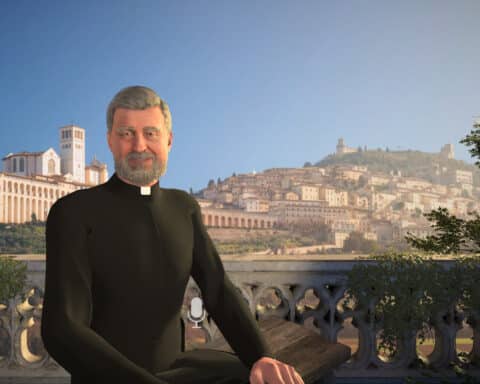A few months ago, Catholic social media (or, at least, the few Catholic accounts I look at on social media) erupted in response to a post from an official NASA social media account. Why NASA posted what it did, I don’t know; what I do know is that the reactions I saw to the post were swift, severe, and completely wrong — not just wrong from a scientific standpoint but from a religious one as well.
The post from NASA noted that color is not inherent in matter. (I started to write “in the world around us,” but we, of course, are part of that world, and what NASA had noted applies to our bodies as well.) Two hundred and thirty years ago, when the poet, novelist, playwright, philosopher, and, yes, scientist Johann Wolfgang von Goethe first made this observation in a critique of Sir Isaac Newton’s experiments with light and refraction, it was, admittedly, novel.
Today, however, the insight at the center of Goethe’s observation is accepted science: The phenomenon of color depends on human perception, which involves the (subconscious) working of the mind, and not just the mechanics of light striking our retina. The sky is blue and the grass is green because we perceive them as such.
The Catholic reaction
Catholic social media reacted to the NASA post faster than you can say “dictatorship of relativism.” This, various well-known Catholics (some of whom I count as acquaintances, and a few as my friends) declared, was the end of science, of rationalism, the triumph of subjectivism. If you claim that color isn’t inherent in matter, then aren’t you saying that color is not an objective phenomenon?
In a word, yes. But that doesn’t mean that it’s subjective, in the common way in which the word is used. It’s not that I have my set of colors, and you have yours, and never the twain shall meet. If you insist that the sky is green and the grass is blue (anywhere outside of Kentucky), you’re wrong, and I will gladly tell you so.
What Goethe grasped, and philosophers and later physicists (starting with the more philosophically minded ones, such as Werner Heisenberg) came to understand over the next century and a half, is that our experience of the world is not one of subject mechanically observing object, but of man participating in nature. (Turns out that the parenthetical up there in the second paragraph, about how we are part of “the world around us,” wasn’t just a throwaway line after all.) And in coming to understand that, these philosophers and physicists came back around to a Christian worldview, whether they realized it or not.
Man as co-creator
A Christian worldview? Yes — one that puts man at the center of the created world and, as a number of the Fathers of the Church would and did say (St. Augustine perhaps most famously), establishes him as a co-creator of that world. We do not and cannot create matter out of nothing, but the universe means nothing without the creatures whom God created in his image and likeness, and to whom God, who spoke the world into being, alone gave the gift of speech and the honor of naming each of the living creatures.
The universe means nothing without the creatures whom God created in his image and likeness, and to whom God, who spoke the world into being, alone gave the gift of speech and the honor of naming each of the living creatures.
Heady thoughts, these, but perhaps we can bring them down to earth by taking a moment to look up at the sky. Like millions of other Americans, my family and I spent a few hours observing, and a few minutes in open eclipse-glasses-free awe of, the solar eclipse that made its way across the United States on April 8. Solar eclipses are not nearly as rare as the media portrayed them, but intuitively reporters did understand that an eclipse that nobody sees is not nearly as meaningful as one that millions of people see.
Meaning, like color, resides in the mind of the beholder, and if God made us to (among other things) enjoy the glories of his creation, why should we be surprised that NASA, like Goethe, was right, and that creation needs our perception to make it whole?





